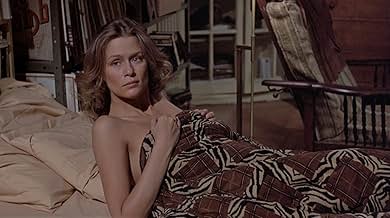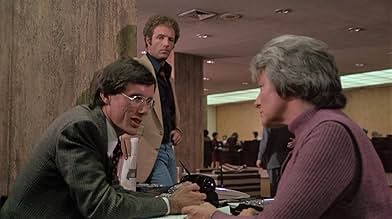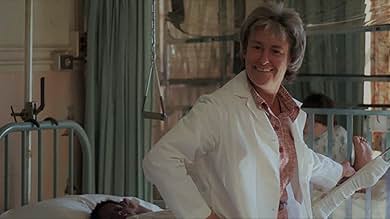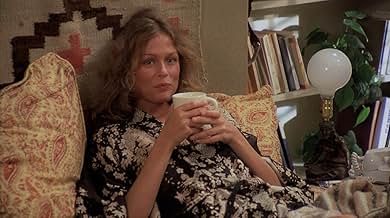Literature professor Axel Freed is a gambling addict. When he has lost his money, he borrows from his girlfriend Billie, then his mother Naomi, and finally some criminals that chase him. Des... Read allLiterature professor Axel Freed is a gambling addict. When he has lost his money, he borrows from his girlfriend Billie, then his mother Naomi, and finally some criminals that chase him. Despite all of this, he cannot stop gambling.Literature professor Axel Freed is a gambling addict. When he has lost his money, he borrows from his girlfriend Billie, then his mother Naomi, and finally some criminals that chase him. Despite all of this, he cannot stop gambling.
- Awards
- 1 nomination total
- Director
- Writer
- All cast & crew
- Production, box office & more at IMDbPro
Featured reviews
Just about everyone who has posted a reply about the shocking ending was simply left too much in the dark to realize that it tied together a different root demise of Axel Freed than gambling.
Just as a compulsive behavior leads to compulsive gambling, the root evil of Axel Freed was that he had a masochist behavior. When you look a little closer at all the scenes where he acts out this kind of behavior, it makes more sense. The problem lies in that the casual observer is only looking at the problem gambling aspect. There is more to this guy than just that.
The ways he handles his relationships with his mother, girlfriend, grandfather and feelings at the end towards the basketball player ALL indicate there is masochist behavior involved. These are more than just selfish acts. There is some actual self hatred going on as well. Without giving away the final scene, this scene further accentuates the point by sending himself into that situation. The final scene was a conscious act, not something resulting from random chance or risk.
So despite the movie having some gambling theme to it, this really wasn't necessarily about gambling addiction. It was about the nature of Axel Freed. If the movie had no gambling scenes in it at all this point would be more readily identifiable.
The only real oddity in the final scene is the placement of the final scene. If this scene was placed somewhere in the middle of the movie, the underlying theme of his masochist pattern of behavior would have been more easily identified with. Because the movie started with a gambling scene, we all assumed it was just about gambling. Wrong!
Its a tricky concept to catch the first time. Watch this movie again with this concept in mind and the movie will make more sense.
Just as a compulsive behavior leads to compulsive gambling, the root evil of Axel Freed was that he had a masochist behavior. When you look a little closer at all the scenes where he acts out this kind of behavior, it makes more sense. The problem lies in that the casual observer is only looking at the problem gambling aspect. There is more to this guy than just that.
The ways he handles his relationships with his mother, girlfriend, grandfather and feelings at the end towards the basketball player ALL indicate there is masochist behavior involved. These are more than just selfish acts. There is some actual self hatred going on as well. Without giving away the final scene, this scene further accentuates the point by sending himself into that situation. The final scene was a conscious act, not something resulting from random chance or risk.
So despite the movie having some gambling theme to it, this really wasn't necessarily about gambling addiction. It was about the nature of Axel Freed. If the movie had no gambling scenes in it at all this point would be more readily identifiable.
The only real oddity in the final scene is the placement of the final scene. If this scene was placed somewhere in the middle of the movie, the underlying theme of his masochist pattern of behavior would have been more easily identified with. Because the movie started with a gambling scene, we all assumed it was just about gambling. Wrong!
Its a tricky concept to catch the first time. Watch this movie again with this concept in mind and the movie will make more sense.
This is a film that must be seen to be believed.
Caan is extraordinary; the emotional truth of this film penetrates each line, each scene...The most searing and intense and exact ending in modern film. The straight-forward telling of a professor with a gambling problem does not prepare one for the scale and price of betrayal and redemption of human emtions that are portrayed. A stunning film.
Caan is extraordinary; the emotional truth of this film penetrates each line, each scene...The most searing and intense and exact ending in modern film. The straight-forward telling of a professor with a gambling problem does not prepare one for the scale and price of betrayal and redemption of human emtions that are portrayed. A stunning film.
The theme of addiction is a favourite area for film makers and "The Gambler" stands as the best and most intelligent film about the addiction of gambling. The fact that it is a little known or seen film is perhaps to do with its intellectual script which, with references to Dostoyevsky, may be too pretentious for some. However, rather than being a cleched film about a good man's decent into the hell of addiction this is a film about a selfish, egotistical man, from a good background, who happily wades deeper and deeper into his obsession.
The film's title pretty much sums up the story, with the character of Axel Freed, played by James Caan, beginning the film as a compulsive gambler but sinking further and further into his habit as the film goes on. He does this despite his undoubted intelligence - he is a college lecturer - and despite the pleading of his mother, rich grandfather and friends.
Freed is by no means a likeable character. Like most addicts all he cares about is his next fix and will happily ask his mother for tens of thousands of dollars to repay an outstanding debt. No one, including his girlfriend, played by Lauren Hutton, and his college students, remain untouched by his addiction, a decision which comes back to haunt him in the film's climax.
Many people have been left puzzled by the film's ending which is cryptic and unresolved. However this merely stands as a metaphor for addiction generally, that it can never be fully cured or ever totally go away. Axel is, however, obviously disgusted with himself and the effect his gambling has had on those around him and his late night journey into the all-black neighbourhood is his way of seeking retribution for his sins.
"The Gambler" provides James Caan with, alongside Michael Mann's "Thief", the best role of his career. The character of Axel Freed provides him with a range of emotions, especially in the way he treats those he cares about, as his gambling slowly takes precedence over everything else. Anyone who thinks James Caan's career began and ended with "The Godfather" should definitely see "The Gambler", as this proves he is one of the top actors of his generation and that he can play more than just the tough guy roles he is too often saddled with.
The film is brilliantly directed by Karel Reisz as not a single scene rings false despite a 111 minute running time. After directing the classic "Saturday Night and Sunday Morning" in Britain, Reisz relocated to America, but, unfortunately, "The Gambler" represents the only time he reached those heights again.
The film's title pretty much sums up the story, with the character of Axel Freed, played by James Caan, beginning the film as a compulsive gambler but sinking further and further into his habit as the film goes on. He does this despite his undoubted intelligence - he is a college lecturer - and despite the pleading of his mother, rich grandfather and friends.
Freed is by no means a likeable character. Like most addicts all he cares about is his next fix and will happily ask his mother for tens of thousands of dollars to repay an outstanding debt. No one, including his girlfriend, played by Lauren Hutton, and his college students, remain untouched by his addiction, a decision which comes back to haunt him in the film's climax.
Many people have been left puzzled by the film's ending which is cryptic and unresolved. However this merely stands as a metaphor for addiction generally, that it can never be fully cured or ever totally go away. Axel is, however, obviously disgusted with himself and the effect his gambling has had on those around him and his late night journey into the all-black neighbourhood is his way of seeking retribution for his sins.
"The Gambler" provides James Caan with, alongside Michael Mann's "Thief", the best role of his career. The character of Axel Freed provides him with a range of emotions, especially in the way he treats those he cares about, as his gambling slowly takes precedence over everything else. Anyone who thinks James Caan's career began and ended with "The Godfather" should definitely see "The Gambler", as this proves he is one of the top actors of his generation and that he can play more than just the tough guy roles he is too often saddled with.
The film is brilliantly directed by Karel Reisz as not a single scene rings false despite a 111 minute running time. After directing the classic "Saturday Night and Sunday Morning" in Britain, Reisz relocated to America, but, unfortunately, "The Gambler" represents the only time he reached those heights again.
I saw this movie back in 1974/75 when it was released. I was already a Caan man. My comments are just random tidbits. Burt Young would go on to join Caan in 1975's The Killer Elite". Monkey (London Lee) was a stand-up comic who appeared numerous times on the Ed Sullivan show in the 60's. Lauren Hutton would trade Caan for Burt Reynolds in Gator. Caan earlier had beat out Burt for the role of Sonny Corleone. The line I remember most from this film is when Axel's mother is trying to get a bank loan to fund his gambling debt. There are some bureaucratic snafus and the bank officer isn't sure he has the proof to approve the loan to mom. Caan says "I came out of her womb and I know she's my mom. Now give her the god... money!".
a shocker in the 70s james toback's take on Dostoevskyan's fate, caan actually seems to act instead of react and gives a far more compelling performance than say, Thief 7 yrs. later. The Gambler is James toback's career making debut and has some of the most intense scenes toback would ever film despite numerous strong films later on. the ending is monumental. watch it build and be amazed. 9 of 10.
Did you know
- TriviaAccording to James Toback, before his screenplay was accepted at Paramount Pictures, and was making the rounds with actors, Peter Boyle was first interested in playing the lead. Robert De Niro lobbied hard for the role, to the point where De Niro started to dress like the writer. Toback pressured director Karel Reisz to meet with De Niro. After meeting him, Reisz said that he would not, and could not consider De Niro for the role, and if Toback kept insisting, he would not be allowed to collaborate on the film further.
- GoofsAxel knocks the pimp's hat off on the second punch. It reappears on his head on the following one.
- ConnectionsFeatured in WatchMojo: Top 10 Gambling Movies (2014)
- SoundtracksSymphony No. 1 in D
Written by Gustav Mahler (as Mahler)
Performed by Koninklijk Concertgebouworkest (as The Concertgebouw Orchestra)
Conducted by Bernard Haitink (as Haitink)
Courtesy of Philips Records
- How long is The Gambler?Powered by Alexa
Details
- Release date
- Country of origin
- Language
- Also known as
- The Gambler
- Filming locations
- Harlem, New York City, New York, USA(Final scenes)
- Production company
- See more company credits at IMDbPro
Box office
- Gross US & Canada
- $1,305,782
- Runtime
- 1h 51m(111 min)
- Sound mix
- Aspect ratio
- 1.85 : 1
Contribute to this page
Suggest an edit or add missing content



































